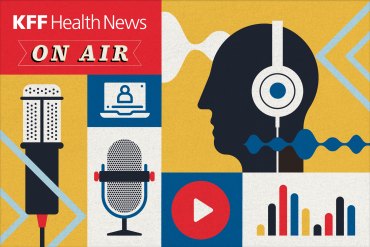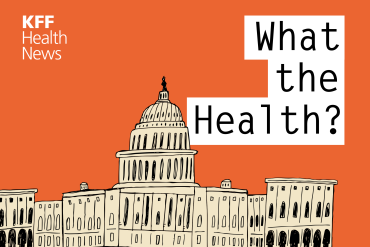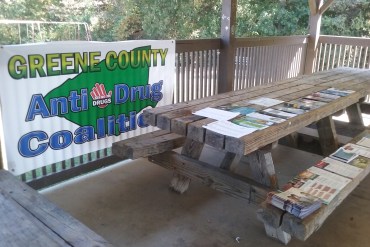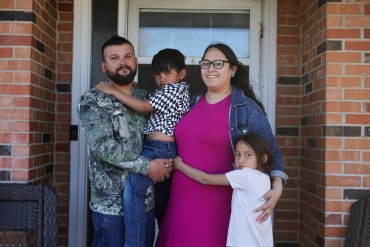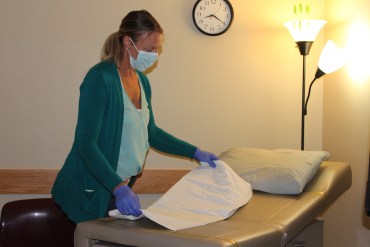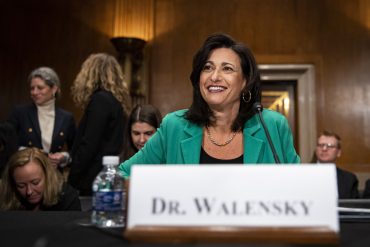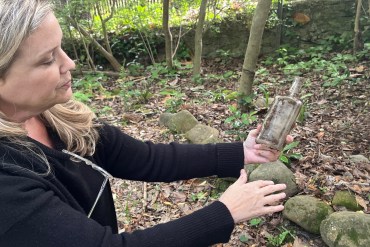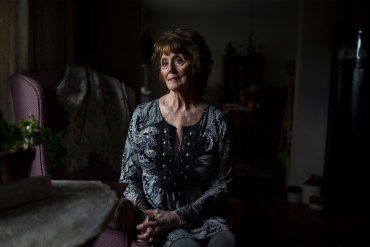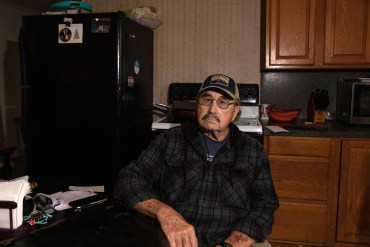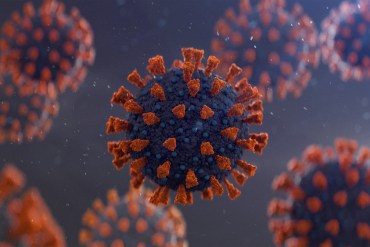As Water Levels Drop, the Risk of Arsenic Rises
As the West grapples with a megadrought, its driest spell in at least 1,200 years, rising levels of arsenic — a known carcinogen — in Colorado’s San Luis Valley offer clues to what the future may hold.
A medida que bajan los niveles de agua, suben los de arsénico
A medida que el oeste lucha contra una mega sequía que ha durado más de dos décadas y los estados corren el riesgo de recortes en el agua del menguante río Colorado, el Valle de San Luis ofrece pistas sobre lo que el futuro puede deparar.
Journalists Unpack Facility School Closures and Federal Investment in Crisis Hotlines
KFF Health News and California Healthline staff made the rounds on national and local media this week to discuss their stories. Here’s a collection of their appearances.
What the Health? From KFF Health News: The Abortion Pill Goes Back to Court
A three-judge appeals court panel heard testimony this week about revoking the FDA’s 22-year-old approval of a key pill used in medication abortion and miscarriage management. The judges all have track records of siding with abortion foes. Meanwhile, as the standoff over raising the federal debt ceiling continues in Washington, a major sticking point is whether to impose work requirements on recipients of Medicaid coverage. Victoria Knight of Axios, Rachel Roubein of The Washington Post, and Sandhya Raman of CQ Roll Call join KFF Health News chief Washington correspondent Julie Rovner to discuss these issues and more.
Lawyer Fees Draw Scrutiny as Camp Lejeune Claims Stack Up
The Camp Lejeune Justice Act, which became law last year, created a pathway for veterans and their families to pursue damage claims against the government for toxic exposure at the military base. Now, advocates and lawmakers worry high lawyer fees could shortchange those injured.
State Lawmakers Eye Forced Treatment to Address Overlap in Homelessness and Mental Illness
Democratic politicians in California and Oregon are reconsidering the restrictions of involuntary commitment laws. They argue that not helping people who are seriously ill and living in squalor on the streets is inhumane.
A Rural County’s Choice: Use Opioid Funds to Pay Off Debt, or Pay Them Forward to Curb Crisis
Greene County, Tennessee, so far has received more than $2.7 million from regional and national settlements with opioid manufacturers and distributors. But most of the money is not going to help people and families harmed by addiction.
New Mexico Program to Reduce Maternity Care Deserts in Rural Areas Fights for Survival
A federally funded program in remote New Mexico has helped hundreds of pregnant mothers stay healthy, but it’s running out of time and money despite a growing national maternity care crisis. The four-year, nearly $3 million grant has provided telehealth, coordinated care, and social services to mothers in need.
Journalists Give Status Reports on the ‘Personhood’ Debate and the HIV Epidemic
KFF Health News and California Healthline staff made the rounds on national and local media this week to discuss their stories. Here’s a collection of their appearances.
What the Health? From KFF Health News: The Crisis Is Officially Ending, but Covid Confusion Lives On
The public health emergency declaration for covid-19 ends May 11, ushering in major changes in how Americans can access and pay for the vaccines, treatments, and tests particular to the culprit coronavirus. But not everyone will experience the same changes, creating a confusing patchwork of coverage — not unlike health coverage for other diseases. Meanwhile, outside advisers to the FDA formally recommended allowing a birth control pill to be sold without a prescription. If the FDA follows the recommendation, it would represent the first over-the-counter form of hormonal contraception. Margot Sanger-Katz of The New York Times, Tami Luhby of CNN, and Joanne Kenen of the Johns Hopkins Bloomberg School of Public Health and Politico join KFF Health News’ Julie Rovner to discuss these issues and more. Plus for “extra credit” the panelists suggest health policy stories they read this week they think you should read, too.
On the Night Shift With a Sexual Assault Nurse Examiner
Montana and other states are trying to increase the number of nurses specially trained to treat survivors of sexual assault.
Walensky to Leave CDC in June as Covid Emergency Winds Down
The Centers for Disease Control and Prevention director presided over one of the most tumultuous times in the agency’s history, struggling to regain public trust after it was revealed that Trump officials intervened in its pandemic response.
California Says New Cigarettes Appear to Violate State’s Flavored Tobacco Ban
The attorney general is warning two tobacco companies, R.J. Reynolds and ITG Brands LLC, that their reformulated cigarettes appear to violate the state’s ban on flavored tobacco products, based on marketing materials. R.J. Reynolds said Thursday that its cigarettes comply with the law.
Lead Contamination Surfaces in Affluent Atlanta Neighborhood
The Environmental Protection Agency recently confirmed high lead levels in an upscale Atlanta neighborhood. The location stands in contrast to many polluted sites investigated by the federal Superfund program — often in former industrial or waste disposal areas where environmental racism has left marginalized groups at risk.
What the Health? From KFF Health News: Health Programs Are at Risk as Debt Ceiling Cave-In Looms
A warning from the Treasury Department that the U.S. could default on its debt as soon as June 1 has galvanized lawmakers to intervene. But there is still no obvious way to reconcile Republican demands to slash federal spending with President Joe Biden’s demand to raise the debt ceiling and save the spending fight for a later date. Meanwhile, efforts to pass abortion bans in conservative states are starting to stall as some Republicans rebel against the most severe bans. Joanne Kenen of the Johns Hopkins Bloomberg School of Public Health and Politico, Rachel Cohrs of Stat, and Alice Miranda Ollstein of Politico join KFF Health News chief Washington correspondent Julie Rovner to discuss these issues and more.
Federal Rules Don’t Require Period Product Ingredients on Packaging Labels. States Are Stepping In.
New York and California have passed laws requiring disclosure of ingredients on menstrual product packaging. Advocates want more transparency across the U.S.
Listen: How Are States Spending Money From the Opioid Settlements? It’s Not Easy to Know
KFF Health News senior correspondent Aneri Pattani appeared on NPR’s “1A” on May 1 to discuss issues related to how opioid settlement funds are being distributed.
As US Life Expectancy Falls, Experts Cite the Health Impacts of Incarceration
In a nation with one of the highest incarceration rates in the world, imprisonment speeds the aging process, research shows. Some experts complain the federal government isn’t collecting or releasing data that could identify disease patterns and prevent deaths.
How One Patient’s Textured Hair Nearly Kept Her From a Needed EEG
An EEG can help diagnose conditions like epilepsy, sleep disorders, and brain tumors. But a design flaw and outdated Eurocentric practices make the test less effective on thicker, denser, and curly hair types, potentially excluding or deterring some people from getting screened.
As Federal Emergency Declaration Expires, the Picture of the Pandemic Grows Fuzzier
The pandemic gave federal officials expanded power to access crucial data about the spread of covid-19, but that authority will change when the public health emergency sunsets in May. That, along with the end of popular covid trackers, will make it harder for policymakers and the public to keep an eye on covid and other threats.





